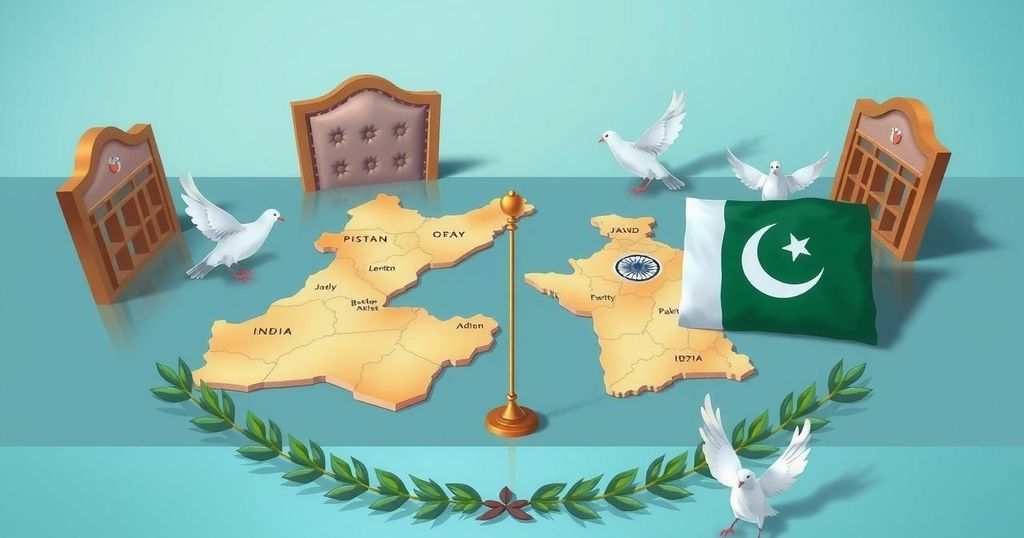During his Senate confirmation hearing, Paul Kapur noted that U.S. Vice President J.D. Vance and Secretary of State Marco Rubio played crucial roles in de-escalating tensions between India and Pakistan amid a recent crisis. He emphasized the U.S. commitment to supporting peace and security in South Asia and the importance of collaboration with other regional nations. Kapur outlined key areas for U.S.-India relations and highlighted a need for continued counterterrorism efforts.
During a recent Senate confirmation hearing, Paul Kapur, nominated by President Trump for the post of Assistant Secretary of State for South and Central Asia, highlighted the roles of Vice President J.D. Vance and Secretary of State Marco Rubio in easing tensions between India and Pakistan. Kapur remarked, “As somebody from the outside looking in, it appeared to me… the Secretary [of State] and the Vice President were actively engaged in using their good offices to encourage de-escalation.” He noted that their involvement likely contributed positively to the situation, allowing both nations to take a step back from potential conflict.
Addressing the issues at hand, Kapur, who also serves as a professor at the U.S. Naval Postgraduate School, reflected on the heightened tensions following a deadly terrorist incident in Pahalgam. India has pinned the incident on Pakistan-based militants. Senator Chris Van Hollen contributed to the conversation by sharing about his discussions with Indian and Pakistani officials in Washington after the crisis.
The senator went on to mention, “President Trump and Secretary Rubio have taken credit for bringing about the ceasefire. As you probably already know, the Indian government has denied that the ceasefire resulted from American mediation. But regardless, there’s a fragile ceasefire in place.” He cited Rubio’s earlier statement about the ceasefire and pressed Kapur on what subjects he would seek to facilitate discussions over if confirmed.
Kapur outlined a range of common interests shared by the U.S. and India, emphasizing the importance of a stable, open Indo-Pacific region free from dominance by China. He highlighted boosting bilateral trade and fostering economic partnerships as priorities. Kapur stated, “If confirmed, I will work to further advance U.S.-India relations…” He also talked about extending security collaboration beneficial to U.S. interests with Pakistan, while promoting trade and investment opportunities between the two countries.
The need for peace in the region was reiterated, drawing attention to how close South Asia had come to conflict recently. “If confirmed, I will continue to promote long-standing U.S. security interests with India and Pakistan through the pursuit of peace and stability…” Kapur said, emphasizing the need to counter terrorism in the region.
He also mentioned the strategic significance of other South Asian nations such as Sri Lanka, Bangladesh, Nepal, Maldives, and Bhutan for overall stability in the Indo-Pacific. He explained that Sri Lanka and the Maldives occupy key maritime trade routes, while Bangladesh has a growing economy, bolstering the regional structure. He expressed a commitment to enhancing U.S. cooperation with these nations to counterbalance China’s influence and increase trade.
Finally, Senate Foreign Relations Committee Chairman, Senator James E Risch, expressed concern over the Indian-Pakistani conflict and highlighted the necessity for ongoing counterterrorism efforts in the region, reiterating that U.S. national security interests align with those of both nations, pushing for a peace resolution between them.
In sum, Paul Kapur’s testimony underscored the roles of key U.S. officials in de-escalating tensions between India and Pakistan, amidst a backdrop of rising threats. His vision includes fostering deeper U.S.-India relations and promoting stability throughout South Asia. The emphasis on cooperation with regional partners could play a pivotal role in maintaining a balance of power, especially in countering China’s influence. The necessity for ongoing peace dialogues and U.S. involvement in counterterrorism remains clear as both countries navigate their complex relationship.
Original Source: www.thehindu.com






